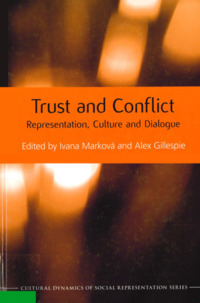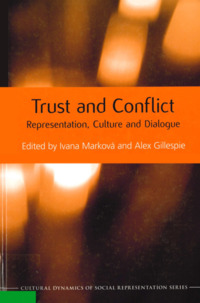- Manifestation
- Βιβλίο έντυπο
- Markova, Ivana (1938-) | Gillespie, Alex
- First edition
- edited by Ivana Markova and Alex Gillespie
-
Hove,
New York City:
Routledge, 2012
- xiv, 224 pages : illustration ; 24 cm.
- Cultural dynamics of social representation
- 9780415593465 (hardcover).
- Includes bibliographical references and indexes
- Original: Βιβλιοθήκη Πανεπιστημίου Κύπρου . - Rules: RDA
-
-
Series Editor’s Foreword. Marková & Gillespie, Preface. Marková: Conflict and Trust in Dialogical Perspective. Part I: Symbolic Systems And Basic Trust. Hosking, Trust and Symbolic Systems: Religion and Nationhood. Wertsch & Batiashvili, Mnemonic Communities and Conflict: Georgia’s and National Narrative Template. Valsiner, The Dynamics of Trust and Non-Trust. Part II: From Categorisation To Social Representation. Rubini & Palmonari, Different and Yet Human: Categorization and the Antecedents of Intergroup Trust. Psaltis, Intergroup Trust and Contact in Transition: A Social Representations Perspective on the Cyprus Conflict. Raudsepp, The Essentially Other: Representational Processes that Divide Groups. Liu, Social Categorisation and Bao in the Age of AIDS: The Case of China. Part III: Situated Trust/Distrust: Points Of Contact. Gillespie, Dialogical Dynamics of Trust and Distrust in the Cuban Missile Crisis. Linell & Keselman, Trustworthiness at Stake: Trust and Distrust in Investigative Interviews with Russian Adolescent Asylum-Seekers in Sweden. Marková, Confession as a Communication Genre: The Logos and Mythos of the Party. Part IV: Concluding Comment. Gillespie, Contact Without Transformation: The Context, Process and Content of Distrust.
-
-
-
Trust, distrust and conflict between social groups have existed throughout the history of humankind, although their forms have changed. Using three main concepts: culture, representation and dialogue, this book explores and re-thinks some of these changes in relation to concrete historical and contemporary events.
Part I offers a symbolic and historical analysis of trust and distrust while Parts II and III examine trust, distrust and conflict in specific events including the Cyprus conflict, Estonian collective memories, coping with HIV/AIDS in China, Swedish asylum seekers, the Cuban missile crisis and Stalinist confessions. With an impressive array of international contributors the chapters draw on a number of key concepts such as self and other, ingroup and outgroup, contact between groups, categorization, brinkmanship, knowledge, beliefs and myth.
Trust and Conflict offers a fresh perspective on the problems that arise from treating trust, distrust and conflict as simplified indicators. Instead, it proposes that human and social sciences can view these phenomena within the complex matrix of interacting perspectives and meta-perspectives that characterise the social world. As such it will be of interest to undergraduates, postgraduates and lecturers of human and social sciences especially social psychology, sociology, political science and communication studies.
-


